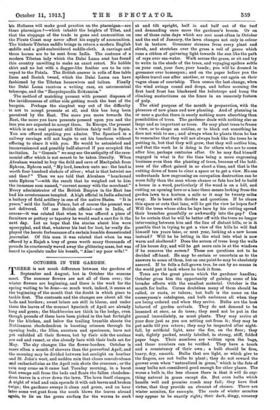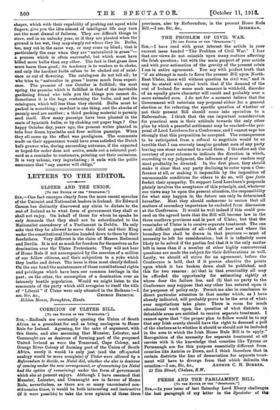OCTOBER IN THE GARDEN.
THERE is not much difference between the gardens of September and August, but in October the seasons meet. The summer flowers are not all of them over; the winter flowers are beginning, and there is the work for the spring waiting to be done—so much work, indeed, it seems at the beginning of the month that the doubt is which piece to tackle first. The contrasts and the changes are about all the beds and borders ; sweet briars are still in bloom, and under them the leaves of the muscari hyacinth of April are already long and green ; the blackberries are thick in the hedge, even though pounds of them have been picked in the last fortnight for the kitchen, and below the trailing bramble shoots the Nobleanuni rhododendron is bursting crimson through its opening buds; the lilies, auratum and speciosum, have not yet unfolded all their flowers, but by their side the azaleas are red and russet, or else already bare with their buds set for May. The sky changes like the flower-borders. October is more often a month of showers than the proverbial April, and the morning may be divided between hot sunlight on heather and St. John's wort, and sudden rain that closes convolvuluses mid eschscholtzias as the April rain shuts the crocuses ; or the rain may come as it came last Tuesday morning, in a burst that sweeps soil from the beds and floats the fallen rhododen- dron leaves in a river down the lawn. The lawn itself changes. A night of wind and rain spreads it with oak leaves and broken twigs ; the gardener sweeps it clean and green, and an hour later some wet gust from the south blows the leaves abroad again, to lie on the green surface for the worms to suck
at and tilt upright, half in and half out of the turf and demanding once more the gardener's broom. Or on one of those calm days which are met most often in October and the end of January, the lawn changes not only in colour but in texture. Gossamer streams from every plant and shrub, and stretches over the grass a veil of gauze which runs a ribbon of quivering light towards the sun like the path of rays over sea-water. Walk across the grass, or sit and try to write in the shade of the trees, and voyaging spiders settle on your coat, your face, your hands ; you will be dressed in gossamer over homespun; and on the paper before you the spiders travel one after another, or voyage out again on their vague chase of courtship. Then comes the last change, when the wind swings round and drops, and before morning the first hard frost has blackened the heliotrope and bung the climbing nasturtiums on the fence in an unseemly festoon of pulp.
The chief purpose of the month is preparation, with the pleasure of new plans and new planting. And of planning in or near a garden there is surely nothing more absorbing than possibilities of trees. The gardener deals with nothing else so large and so important as trees. He may plant trees to frame a view, or to shape an outline, or to block out something he does not wish to see ; and always when he plants them he has to remember that they will not always look like the trees he is putting in, but that they will grow, that they will outlive him, and that the work he is doing is for others who are to come after him, perhaps centuries after. Or he may find himself engaged in what is for the time being a more engrossing business even than the planting of trees, because of the bold- ness of the effect gained in so short a time, and that is the cutting down of trees to clear a space or to get a view. No one understands how engrossing an occupation destruction can be more fully than the man whom chance or fate has led to build a house in a wood, particularly if the wood is on a hill, and cutting an opening here or a lane there means looking from the garden lawn to a horizon a mile or it may be twenty miles away. He is beset with doubts and questions. If be clears this space or cuts that lane, will he get the view he hopes for? Will the trees whose sides he lays bare by his cutting spread their branches gracefully or awkwardly into the gap ? Can he be certain that he will be better off with the trees no longer intervening between him and the line of distant bills, or is it possible that in trying to get a view of the hills he will find himself ten years later, or next year, looking at a new house instead P Will he be letting in the wind into what is now warm and sheltered P Does the screen of trees keep the walls of his house dry, and will he get more rain in at the windows if he removes the screen? These are questions not to be decided off-hand. He may be certain or uncertain as to the answers to some of them, but on one point he may be absolutely assured. If he fells a full-grown tree, he can by no means in the world put it back where he took it from.
Trees are the great pieces which the gardener handles; October gives him the opportunity of gaining some of his broader effects with the smallest material. October is the month for bulbs. Corms doubtless many of them should be called, or roots, or tubers ; but bulb is the name on the nurserymen's catalogues, and bulb embraces all when they are being ordered and when they arrive. Bulbs are the best behaved of garden arrivals. They do not demand to be loosened at once, as do trees ; they need not be put in the ground immediately, as must plants. They may arrive at your door just as you are setting out from it; they may be put aside till you return; they may be inspected after night- fall, by artificial light, near the fire, on the floor; they wait, tightly packed, neatly labelled, in strong, stiff, folded paper bags. Their numbers are written upon the bags, and those numbers can be verified. They have a touch and a consistency of their own ; a bulb should be firm, heavy, dry, smooth. Bulbs that are light, or which give to the fingers, are not bulbs to plant ; they do not reward the grower even when "naturalized in grass," which is the fate of many bulbs not considered good enough for other places. The worse a bulb is, the less chance there is that it will do any- thing natural in grass except die. But even bulbs which handle well and promise much may fail; they have that virtue, that they provide an element of chance. There are winter aconites, for example. The roots of winter aconites may appear to be exactly right; their dark, dingy, uncanny shapes, which with their capability of pushing out squat white fingers, give you the idea almost of intelligent life may turn out the most dismal of failures. They are difficult things to store, and in an unlucky year, or if they are planted when the ground is too wet, they may simply rot where they lie. Bulbs, too, may rot in the same way, or may come up blind ; that is particularly the case when they are " naturalized in grass "- a process which is often successful, but which must have killed more bulbs than any other. The fact is that grass does more harm than good ; its tendency is to weaken or to choke, and only the hardiest bulbs refuse to be choked out of exist- ence or out of flowering. The catalogues do not tell all; he who tries to " naturalize in grass " learns much from experi- ence. The promise of one October is fulfilled; the next spring the promise which is fulfilled is that of the inevitable gardening friend who tells you the things you cannot do. Sometimes it is the bags containing the bulbs, and not the catalogues, which tell less than they should. Bulbs must be packed in something ; sawdust is one thing, and the shucks of parsnip seed are another; a third packing material is parsnip seed itself. How many parsnips have been planted in the coats of hyacinth bulbs, or by shaking out paper bags ? One happy October day, years ago, the present writer planted in tubs four dozen hyacinths and four million parsnips. When they all came up the effect was prodigious. The comments made on their appearance would have even satisfied the Dutch bulb grower who, during succeeding autumns, if the expected or hoped-for order does not arrive, sends out a coloured post- card as a reminder to customers, pointing out their omissions. It is very urbane, very ingratiating ; it ends with the polite assurance that "any answer will oblige."















































 Previous page
Previous page